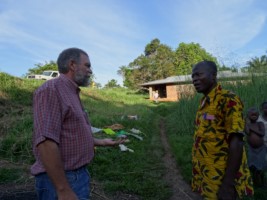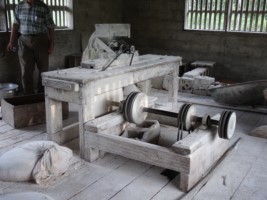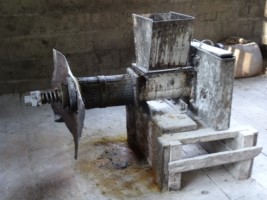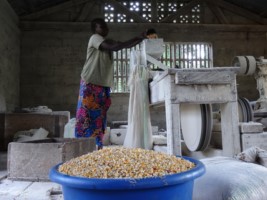Sitdo’s turbine continues to grind corn and provide a few lights 17 years after it started operating. This project was a joint venture of CIDA (Canadian International Development Association) and the CEUM (Congo Covenant Church) through Covenant World Relief (CWR).
Paul Noren, Sheldon Gilmer, and others saw potential in the Songbolo stream as it flowed down hill. After study, they determined there was enough of a drop and flow to warrant the investment in a small dam and hydro-mechanical installation. A hydro-mechanical installation serves to harness the potential energy of the water flowing downhill through the use of a small turbine which is connected to the equipment by belts. A small dam was constructed on the stream. The dam serves to raise the drop of the water to the turbine site. The water flows through the pinstock to the turbine.
![turbine, milling house from bridge [320x200]](http://blogs.covchurch.org/ekstrand/wp-content/uploads/sites/12/2014/10/turbine-milling-house-from-bridge-320x200.jpg) When this hydro site was planned, a lot of coffee was grown in the area and the business plan included making money on coffee hulling which greatly improves the market price. This would have been a win-win because the grower would get more for his coffee harvest and the mill owner, Sitdo, would also make good money hulling the coffee. However, soon after the site started functioning in 1997, the civil war broke out and the options for marketing coffee changed radically. Then there was a disease that ravaged much of the coffee. The result is that today there is little coffee to hull.
When this hydro site was planned, a lot of coffee was grown in the area and the business plan included making money on coffee hulling which greatly improves the market price. This would have been a win-win because the grower would get more for his coffee harvest and the mill owner, Sitdo, would also make good money hulling the coffee. However, soon after the site started functioning in 1997, the civil war broke out and the options for marketing coffee changed radically. Then there was a disease that ravaged much of the coffee. The result is that today there is little coffee to hull.
Nonetheless, Sitdo’s mill continues to function and serve the community. He grinds corn into flour and at times presses palm oil nuts to extract the oil.
He told me that since people did not have much money, they would pay him for grinding their corn with some of the corn. This worked but had its own problems because at times they got so much corn they could not eat it before it started to go bad. They also did not have adequate storage to keep it for a long time.
This past August, they started requiring cash payments for grinding corn. They charge 3,000 francs ($3.26) to grind the amount of corn in the basin. If needed they’ll reduce the price as low as 2,000 francs ($2.18).




